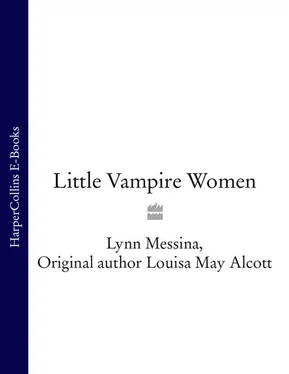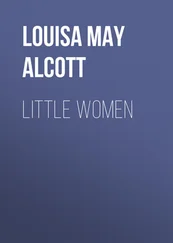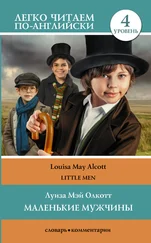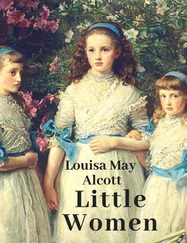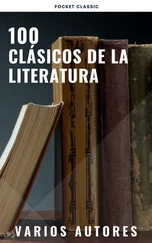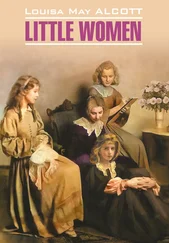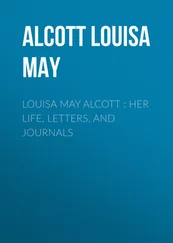“We all will,” cried Meg. “I think too much of drinking cow and deer blood and wearing beautiful silk gloves, but I won’t any more, if I can help it.”
“I’ll try and be what he loves to call me, ‘a little vampire woman’, and not be rough and wild, but do my duty here instead of wanting to be somewhere else,” said Jo, thinking that keeping her temper at home was a much harder task than facing a rebel or two down South.
Beth said nothing, but wiped away tears with the blue army sock and began to knit with all her might, losing no time in doing the duty that lay nearest her, while she resolved in her quiet little soul to be all that Father hoped to find her when the year brought round the happy coming home.
Mrs March broke the silence that followed Jo’s words, by saying in her cheery voice, “Do you remember how you used to play Vilgrim’s Progress 4 when you were young things? Nothing delighted you more than to have me tie my piece bags on your backs for burdens, give you hats and sticks and rolls of paper, and let you travel through the house from the cellar, which was the City of Destruction, up, up, to the housetop, where you had all the lovely things you could collect to make a Celestial City.”
“What fun it was, especially going by the lions, fighting Apollyon, and passing through the valley where the hobgoblins were,” said Jo, for all the challenges that poor Vilgrim, the vampire pilgrim, had to overcome in his quest for heaven greatly resembled a course for the training of vampire defenders.
“I liked the place where the bundles fell off and tumbled downstairs,” said Meg.
“I don’t remember much about it, except that I was afraid of the sunlight that poured into the attic. If I wasn’t too old for such things, I’d rather like to play it over again,” said Amy, who really was too old for childish games despite her persistently youthful appearance.
“We never are too old for this, my dear, because it is a play we are playing all the time in one way or another. Our burdens are here, our road is before us, and the longing for goodness is the guide that leads us through many troubles, mistakes and uncontrollable feeding frenzies to inner peace, which is the true Celestial City. Now, my little vilgrims, suppose you begin again, not in play, but in earnest, and see how far on you can get before Father comes home,” Marmee suggested, concerned now, as always, with the preservation of her daughters’ souls, for it had not been that many years past since vampires were thought to have no soul at all. For centuries, they were considered minions of the devil and were forced to hide in shadow, fearful that any seemingly harmless gathering of people would quickly become an angry, stake-bearing mob. But thanks to the Camp Moldoveneascâ Accords 5 that was all in the past.
“Really, Mother? Where are our bundles?” asked Amy, who was a very literal vampire.
“Each of you told what your burden was just now, except Beth. I rather think she hasn’t got any,” said her mother.
“Yes, I have. Mine is dishes and dusters, and envying vampires with nice pianos, and being afraid of people.”
Beth’s bundle was such a funny one that everybody wanted to laugh, but nobody did, for it would have hurt her feelings very much.
“Let us do it,” said Meg thoughtfully. “It is only another name for trying to be good, and the story may help us, for though we don’t want to feed on humans, it’s hard work resisting our basic demon natures.”
They talked over the new plan while old Hannah cleared the table, then out came the four little work baskets, and the needles flew as the girls made blackout curtains for Aunt March, who didn’t trust the store-bought article to keep out the light. At nine, they stopped work and went to their coffins.
1 Bestselling how-to that introduced the so-called scientifical method of slayer hunting, by Clifford Farmer (b. 1685).
2 Invented by Willis Whipetten (1750-1954) for his son, John, who suffered from dysgeusia garlisima, a chemosensory disorder that makes everything smell like garlic.
3 Paulson Dillywither (1834-1897) argues convincingly in Vampire Habits and Customs: The Beastly True Nature of Nature’s True Beast that lacrimal haemoglobin emissions, also known as blood tears, are caused by an infiltration of blood into the nasolacrimal duct.
4 Seminal text that first suggested vampires were children of God and therefore worthy of entrance into heaven; by William Swinton (1321-1569). Swinton cited the gift of immortality as proof of God’s preference for vampires over their mortal counterparts and even hinted that humanity itself might be damned. John Bunyan’s The Pilgrim’s Progress is largely thought to be an almost verbatim rip-off of the book, although defenders have argued it is a pastiche.
5 The international meeting held in 1767 that officially established vampires as naturalised citizens of heaven and granted them full inalienable rights. Out of the Accords came the groundbreaking Swift Nourishment Act, which reclassified the vampiric method of attaining sustenance as commerce, thereby making the consumption of humans who fell below the poverty level a safe and legal option for hungry vampires, as long as said vampires met the asking price and filled out the appropriate paperwork. Named after Jonathan Swift, who first proposed the arrangement in his famous 1729 essay “A Modest Proposal”, in which he recommended that Ireland’s poor solve their economic woes by selling their children for food.
Chapter Two
A MERRY CHRISTMAS
Jo was the first to wake in the grey twilight of Christmas night. No little creatures hung at the fireplace squirming, and for a moment she felt disappointed. Then she remembered her promise to her mother and resolved not to mind a corpse-free holiday.
“Where is Mother?” asked Meg, as she and Jo ran down a half an hour later.
“Goodness only knows,” replied Hannah, who had lived with the family since the girls were sired, and was considered by them all more as a friend than a servant.
“She will be back soon, I’m sure, warm the blood and have everything ready,” said Meg.
Meg counted the gift bundles in the basket under the sofa and noticed Amy’s was missing. A moment later, the youngest March came into the house and looked rather abashed when she saw her sisters all waiting for her.
“Where have you been, and what are you hiding behind you?” asked Meg, surprised to see, by her hood and cloak, that lazy Amy had been out so early.
“Don’t laugh at me, Jo! I didn’t mean anyone should know till the time came. I only meant to change the little mouse for a big rat, and I gave all my money to get it, even though I had to break into the shop, for the store was closed on account of the holiday, and I’m truly trying not to be selfish any more.”
As she spoke, Amy showed the plump rat which replaced the slight mouse, and looked so earnest and humble in her little effort to forget herself that Meg hugged her on the spot, and Jo pronounced her “a trump”, while Beth ran to the window, and picked her finest rose to ornament the stately vermin.
“You see I felt ashamed of my present, so I ran to the shop and changed it the minute I was up, and I’m so glad, for mine is the most delicious one now.”
Another bang of the street door announced the arrival of their mother.
“Merry Christmas, Marmee! Many of them!” they all cried in chorus.
“Merry Christmas, little daughters! I’m sorry I’m late,” she said. “But not far away from here lies a poor woman with a newborn baby. Six children are huddled into one bed to keep from freezing, for they have no fire. There is nothing to eat over there, and the oldest boy came to tell me they were suffering hunger and cold. Being a vampire means I have to work doubly hard to be good, so I immediately went to them to offer my services.”
Читать дальше
